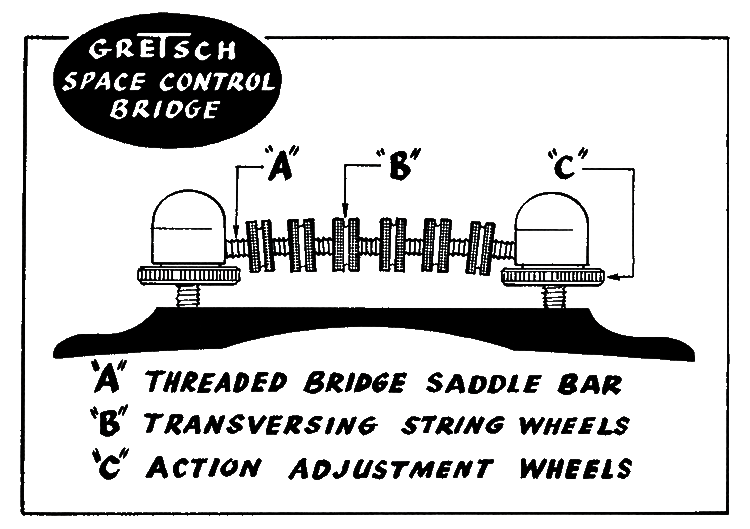Bridge Adjustment
Floating Bridge Adjustment
Gretsch® guitars use a variety of “floating” bridges, coupled with fixed or vibrato tailpieces.
A floating bridge has an arched wooden or metal base held in position on the instrument top only by the downward pressure of the strings. If the bridge is moved even slightly while re-stringing, the intonation will no longer be true (some Gretsch instruments feature “pinned” bridges that eliminate this possibility).
To adjust floating bridge intonation on a guitar, first check the 12th-fret harmonic and the fretted 12th-fret tuning of both E strings (high and low). If properly intonated, the fretted and harmonic 12-fret pitches of both E strings will agree, with none of them being sharp or flat.
If the pitch of the 12th-fret note is sharp relative to the pitch of the 12th-fret harmonic, lightly tap the foot of the bridge to move it back toward the tailpiece until both pitches agree.
If the pitch of the 12th-fret note is flat relative to the pitch of the 12th-fret harmonic, lightly tap the foot of the bridge to move it forward toward the neck until the two pitches agree.
To fine-tune fully adjustable bridges, adjust each saddle forward or back using the individual intonation screws while checking the tuning of the 12-fret harmonic against the fretted 12th fret pitch.
IMPORTANT NOTE: When re-stringing a guitar with a floating bridge, change strings one at a time. Do not remove all the strings at once, as the bridge is held in the correct position only by the downward pressure of the strings.
Space-Control™ Bridge Adjustment
The position, height and saddle spacing of the floating Space-Control bridge are preset at the factory to standard Gretsch specifications. However, guitarists can adjust saddle/string spacing and string height to their own personal preference.
As illustrated above, six knurled “transversing” string wheels (B) are positioned along the threaded bridge saddle bar (A). To adjust string spacing, loosen the string slightly and lift it gently just in front of the bridge, then move the string wheel by turning it in the desired direction. The height of the bridge bar above the bridge base can be finely adjusted using one or both of the action adjustment wheels (C) at each end of the threaded bridge saddle bar. Strings must be re-tuned after these adjustments.

